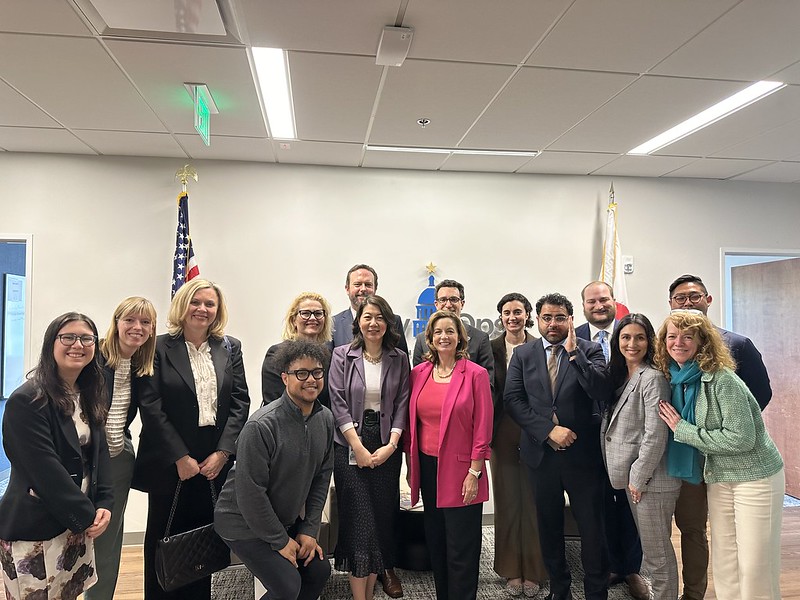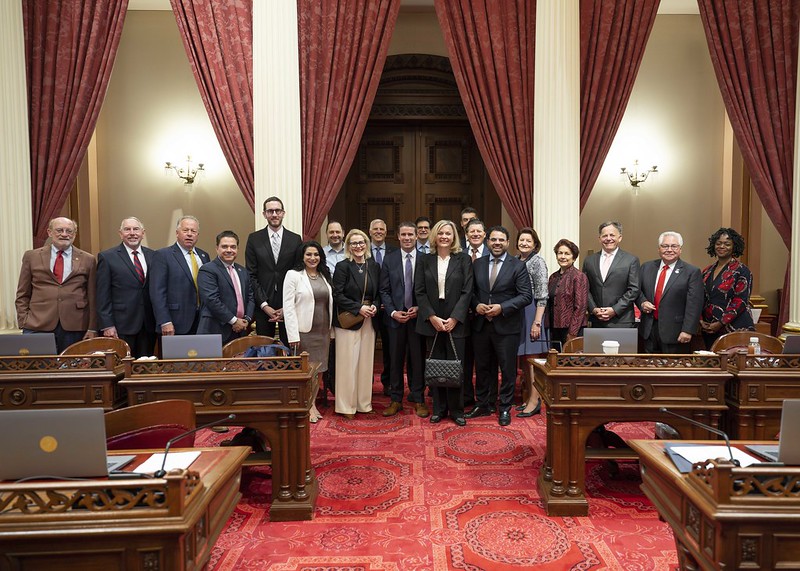Unlocking the California Effect: Insights from the Transatlantic Tech Exchange in Sacramento
In Sacramento, the delegation met with state senators and assemblymembers, government officials, and members of civil society, industry, and academia.
The following three takeaways emerged from our conversations in Sacramento:
- The California effect offers new opportunities for transatlantic conversations.
MEP participants were briefed on the concept of the “California effect”. This effect, born out of 1970s environmental regulation, refers to California’s leading role in passing stringent regulations that cause corporations to modify practices, even on a national or international level, rather than create a distinct set of rules for Californians. MEPs compared this “race to the top” phenomenon to the “Brussels effect”, which refers to the idea that the EU sets market standards that often spread beyond the EU.
California is also trying to put in place stronger guardrails on social media companies. For example, one week after California’s Age-Appropriate Design Code Act, which requires stronger privacy protections for children online, was signed into law in August 2022, New York state senators announced that they would introduce a similar bill. The Act is also similar to legislation that followed in Maryland, Minnesota, and Utah. California’s online security laws requiring data breach notifications have also served as a model for legislation passed in almost half of US states.
California lawmakers’ optimism that the majority of over 30 state-level bills related to AI introduced this session could pass invigorated the regulatory exchange among policymakers. The delegation urged Californian staffers to come to Brussels to learn from EU technology regulatory efforts and implementation. Participants concluded that future transatlantic conversations could benefit from the inclusion of Californian lawmakers alongside US members of Congress.

- Direct democracy mechanisms have shaped California’s rights-based approach to technology policy.
California led the nation on privacy regulation by passing the landmark California Consumer Privacy Act in 2018, guaranteeing privacy rights to California consumers—including the right to delete and opt-out of the sale of personal data. The law was significantly amended in 2020 by the California Privacy Rights Act (CPRA), which granted the right to correct inaccurate personal information collected and further limit companies' use of sensitive personal information. The CPRA also helped maintain the California Privacy Protection Agency (CPPA)’s independence by writing in an annual de facto budget of $10 million (adjusted yearly for inflation) for the Agency to insulate it from political swings in the legislature.
MEP participants were surprised to learn that these acts passed through ballot initiatives spearheaded by a private citizen, Alastair Mactaggart, and his organization Californians for Consumer Privacy, and not through the regular legislative process. The organization advocated for legislators to consider CCPA and helped collect more than the 600,000 signatures required to get CPRA on the ballot. Mactaggart now sits on the CPPA board.
While California was the first state to pass a comprehensive data privacy bill, kickstarting a national conversation on data privacy, the EU model that the state used in its privacy legislation has not been copied across other states. Many states that have subsequently passed data privacy legislation have used a Virginia legislation model that was more heavily influenced by technology corporations.
MEPs debated the importance of public participation in the legislative process, and civil society interlocutors encouraged MEPs to maintain an ongoing dialogue with privacy activists and organizations. Additionally, MEPs noted that the US policy process involves greater input from industry and civil society members, as well as more of a revolving door between government and industry than in the EU. While this model may be more likely to present ethical conflicts to be navigated, its benefit is that it allows government employees with past industry experience to bring greater technical knowledge to policymaking.

- The EU is working with California to develop new legislation, and California is eager for more cooperation.
The EU is actively collaborating with California to formulate new legislation on artificial intelligence technology, social media platforms, and data protection—a partnership that California lawmakers are keen to expand. The EU Office in San Francisco has been instrumental in this process, facilitating meetings with assembly members and fostering relationships with state senators. While staff in California’s executive branch have engaged less with the EU Office, they were eager to speak with the delegation and learn more about the EU regulatory process on key technologies, especially AI.
EU Parliament delegations to California are becoming more frequent, indicating that the infrastructure for regular EU-California bilateral conversations is starting to develop. However, the EU faces a trade-off when deciding how best to collaborate with US policymakers: While California is a like-minded partner on policy, it holds less sway than the federal government.

MEPs and California state senators on the California Senate floor.
Members of the EU Parliament who visited Sacramento ended the trip energized by the innovative regulatory culture in California and the shared democratic values and principles between Californian and EU lawmakers.
Read more takeaways from the Transatlantic Tech Exchange’s visits to Washington and Austin.
The views expressed herein are those of the author and do not necessarily reflect those of the MEP delegation, GMF, or Stiftung Mercator.
